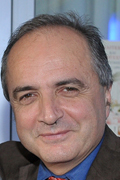LIONIS, Prof Christos
Greece: WONCA leader

Where do you currently work?
Since 1995, I have served the School of Medicine at the University of Crete, where I am currently a Professor of General Practice and Primary Care and Director of the Clinic of Social and Family Medicine.
http://www.fammed.uoc.gr
My responsibilities include teaching, research and clinical duties. I teach two elective courses to undergraduate medical students: one on the doctor-patient relationship and another on compassionate care. I am also coordinator of a masterʼs course where modules relevant to family practice and primary care are taught to qualified family physicians.
I am coordinator of a local GP Network, which engages in research activities and offers primary care services to people residing in rural areas. My clinical duties involve providing services to a deprived population in inner Heraklion, at a Primary Health Care Centre jointly operated by the University Hospital of Heraklion and the Municipality of Heraklion in the island of Crete. In addition, I offer clinical services to residents of isolated mountainous areas on Crete, where access to health care is minimal. These services are offered via the ʽUniversity of the Mountainsʼ, a non-profit organization and an initiative of the University of Crete.
What your hobbies or passions outside work are?
In a country that is currently experiencing one of its largest challenges in its history, there is very little time for leisure activities and hobbies, because of my volunteer involvement and compassionate care of many underserved populations. However, I very much enjoy listening to music, reading philosophy and writing poems.
What does being a family doctor mean to you in your country?
In Greece, the discipline of Family Medicine is still growing and still seeks recognition by the Greek population, political leaders, health care authorities and academy. There are many challenges at the moment where Greece meets a high recession, and many efforts to build capacity should be undertaken. The role of the medical faculties and academia in general is crucial, but there remains some reluctance to general practice being recognised as an independent academic discipline. Combined efforts between the academic capacity, the Greek Association of General Practitioners, and the Ministry of Health and Solidarity are an urgent need.
What have you enjoyed about your involvement with WONCA?
My involvement with WONCA goes back many years and has always been enjoyable. I served on the WONCA Europe and EGPRN Executive Board, in the past. I am currently serving certain WONCA Working Parties and Special Clinical Interest Groups at the world or European level, while I am serving the Editorial Board of certain International and European Journals. I have learned and I am still learning much from this experience.
Firstly, to recognize the importance of networking and learning from others, and secondly that the holistic and comprehensive approach of patients in primary care is a unique resource in recognizing ones needs and limitations as a human being. This experience teaches us how to behave in a world of uncertainty and promotes our skills in working in a setting where at certain times; empathy and compassion are the best tools in alleviating human pain.